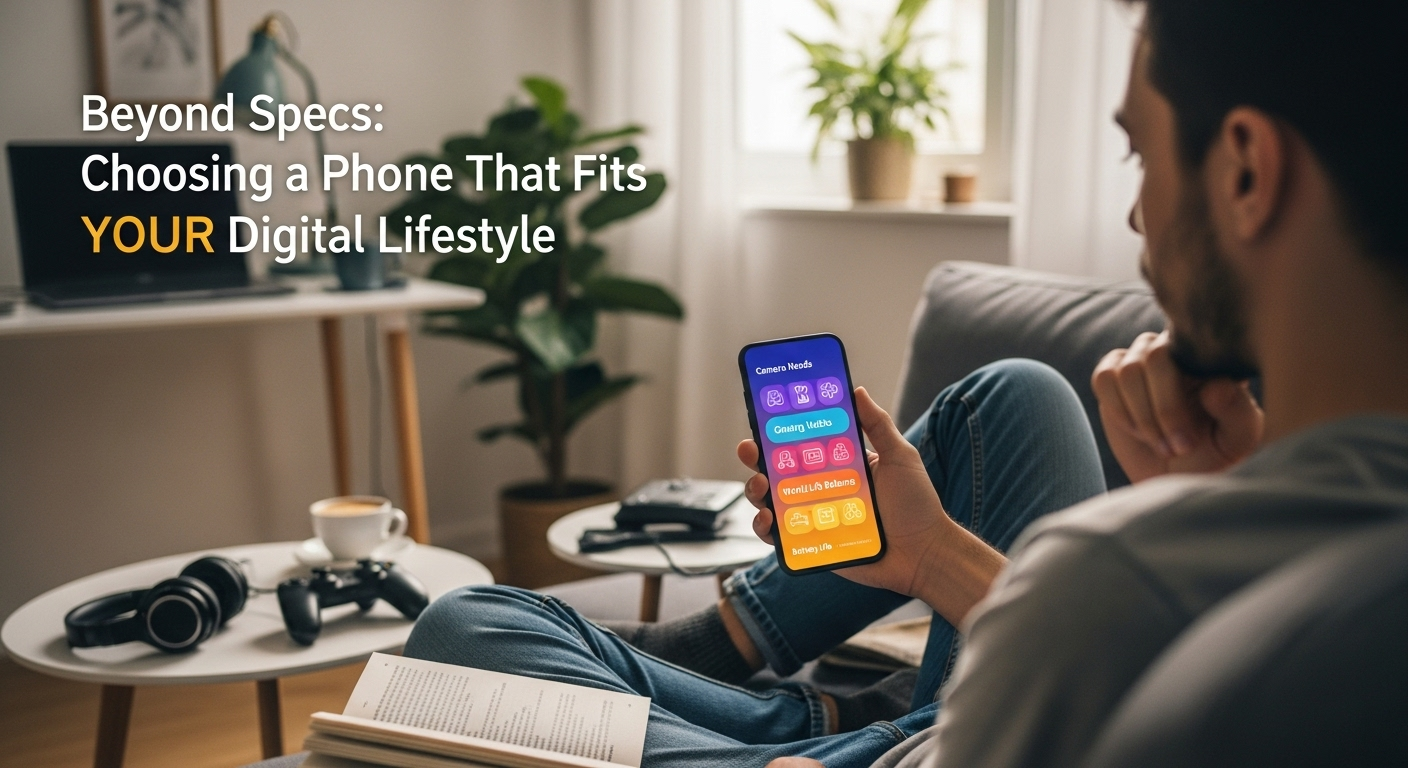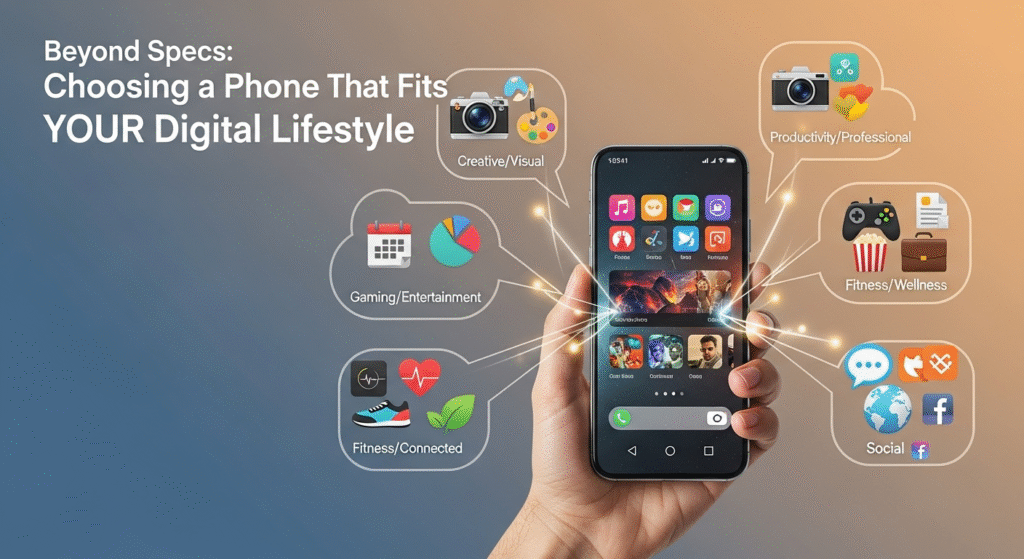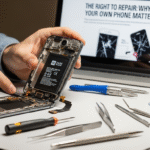Okay, let’s be honest. Shopping for a new phone these days feels less like an exciting upgrade and more like deciphering ancient hieroglyphs. It’s a blizzard of GHz, RAM, megapixels, and marketing buzzwords designed to overwhelm. But here’s the thing – do you really need the latest octa-core processor with 16GB of RAM to check your email and scroll through TikTok? Probably not.
I mean, think about it. We’ve all been there, right? Mesmerized by the sleek design and impressive specs of the latest flagship phone, only to realize, a few months down the line, that 80% of its features are completely unused. It’s like buying a Ferrari to drive to the grocery store – overkill, to say the least. And a waste of money, for sure!
So, what’s the alternative? Simple: choosing a phone that genuinely fits your digital lifestyle. It’s about moving beyond the hype and focusing on what actually matters to you. What do you really use your phone for?
Thinking About Your Core Phone Needs

Before you even think about stepping foot in a phone store (or, let’s be real, opening a new tab on Amazon), take a moment to reflect. What are your must-have features? Are you a social media maven who needs a killer camera and all-day battery life? Or are you more of a practical user who prioritizes call quality, storage for documents, and a robust email experience?
I know, it sounds obvious, but so many people skip this crucial step. They get swept up in the marketing frenzy and end up with a phone that’s completely wrong for them. Actually, that’s not quite right. They don’t think about it at all and then they get mad when their new phone only lasts half a day!
Think about the apps you use most. Do you play graphics-intensive games? Stream a lot of video? Or are you mostly just browsing the web and checking social media? The answers to these questions will help you determine the kind of processing power and screen resolution you actually need. And you can find your answer on our webiste too with this Crazy Games.
The Camera Conundrum: More Megapixels Aren’t Always Better
Ah, the camera. The siren song of smartphone marketing. We’re constantly bombarded with claims of ever-increasing megapixel counts and revolutionary new camera technologies. But here’s the thing: megapixels aren’t everything. In fact, they’re often less important than other factors, such as sensor size, aperture, and image processing software.
I initially thought megapixels were the only thing that mattered, but after looking deeper, I realized that the quality of the lens and the software that processes the image are just as important, if not more so. A phone with a 12-megapixel camera and a great lens can often take better photos than a phone with a 48-megapixel camera and a subpar lens. It’s all about the total package.
Consider what you’ll primarily be using your phone’s camera for. If you’re just taking snapshots for social media, you probably don’t need a phone with a ridiculously high megapixel count. But if you’re planning on printing large-format photos, then megapixels become more important. And don’t forget about video quality! Speaking of total packages, video is super important these days.
Battery Life: The Unsung Hero
Let’s face it: a phone with amazing specs is useless if it runs out of battery halfway through the day. Battery life is arguably the most important factor to consider when choosing a new phone. You might be wondering, “How do I know which phones have good battery life?” Well, read reviews! Look for phones with high mAh (milliampere-hour) ratings, but don’t rely on that alone. Battery life also depends on how you use your phone and how well the phone’s software is optimized for power efficiency. The frustrating thing about this topic is that testing is everything. I keep coming back to this point because it’s crucial to see how long you can use it when it’s in your hands.
Here’s a tip: pay attention to what reviewers say about real-world battery performance. Do they mention having to charge the phone multiple times a day? Or does it easily last a full day with moderate to heavy use? These are the kinds of details that will help you make an informed decision.
Operating System: Android vs. iOS
The choice between Android and iOS is a personal one, and there’s no right or wrong answer. Each operating system has its own strengths and weaknesses. Android is known for its customization options and open-source nature, while iOS is known for its user-friendliness and tight integration with Apple’s ecosystem. I have a soft spot for iOS, but that’s just me. Your mileage may vary!
Think about it this way: Android is like a sprawling, customizable workshop with tons of tools and options. iOS is like a streamlined, user-friendly kitchen with everything in its place. Which one appeals to you more? One is not better than the other; they are just different.
And hey, you can check out the latest operating system news here. Okay, that’s a slight tangent, but you get the idea. Keep up with the developments!
FAQ: Picking the Perfect Phone For You
How do I know if a phone has enough storage for my needs?
This depends entirely on how you use your phone. If you take a lot of photos and videos, download a lot of apps, or store a lot of music and movies on your device, you’ll need more storage. A good rule of thumb is to start with at least 128GB of storage. But if you’re a power user, you might want to consider 256GB or even 512GB. Remember, cloud storage is also an option, but it requires an internet connection.
Why are some phones so much more expensive than others?
The price of a phone is determined by a number of factors, including the quality of its components, the complexity of its design, and the brand’s marketing budget. Flagship phones from major brands like Apple and Samsung tend to be the most expensive, while budget-friendly phones from lesser-known brands tend to be more affordable. Ultimately, you get what you pay for, but that doesn’t mean you need to break the bank to get a good phone.
How can I find reliable reviews of phones?
There are many reputable websites and YouTube channels that provide in-depth reviews of phones. Look for reviews that are unbiased and that provide detailed information about the phone’s performance, camera, battery life, and other key features. Be wary of reviews that are overly positive or negative, as they may be biased. A good review will present both the pros and cons of a phone in a balanced and objective way.
Beyond Specs: Choosing a Phone That Fits YOUR Digital Lifestyle, how can I tell if a phone is durable?
Check for features like Gorilla Glass screen protection and water/dust resistance ratings (IP ratings). Read user reviews to see if people report issues with the phone’s durability. Some manufacturers also offer ruggedized phones designed to withstand more extreme conditions. Consider a protective case and screen protector regardless of the phone’s inherent durability.
Ultimately, the best phone for you is the one that meets your specific needs and budget. Don’t get caught up in the hype or the marketing buzzwords. Do your research, think about how you’ll actually be using your phone, and choose a device that fits your digital lifestyle. You might be surprised at how much money you can save – and how much happier you’ll be with your purchase.



